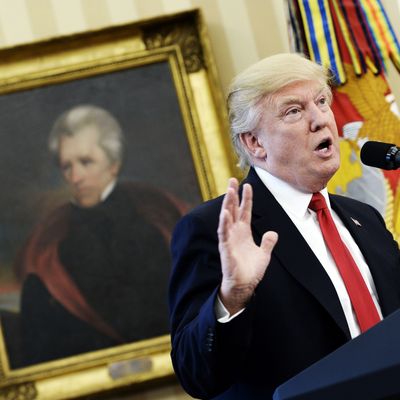
It’s been hours, not days, since Donald Trump suddenly authorized a military strike on Syria, apparently in retaliation for the Assad regime’s use of chemical weapons against its own population. So it is unclear what Trump and his advisers intend to do now in that theater, or if indeed this was a one-off demonstration to the world that, unlike his predecessor, the 45th president is willing to use lethal force without any dithering.
In one key respect, however, the action was in character for Trump as a self-consciously “Jacksonian” president who simultaneously reveres military force while despising the “globalist” ideologies that have both justified and restrained its use so often in U.S. history. “Jacksonians” typically oppose entangling alliances and international nation-building exercises, but not only accept but welcome massive violence when America is “crossed.” For Trump in particular, intimidation of enemies is as important to international affairs as it is to business life. That is why Trump constantly attacked Barack Obama for failing to back up his “red line” threats against Syria’s use of chemical weapons (an attack he repeated before launching the cruise missiles last night) even as Trump himself denied any interest in “taking sides” in that country’s messy civil war. And in his initial comments on the attacks, Secretary of State Rex Tillerson made it pretty clear they were motivated by cumulative Syrian behavior, not just the atrocities the president watched this week on television.
And so: Trump sought to remove the stain to American honor caused by Obama’s inaction after threatening Assad. That is a very Jacksonian thing to do, particularly when done in a way that puts not just Assad but all potential enemies on notice that liberal “restraint” in the use of military power is a thing of the past.
Understood in this manner, Trump’s decision to act without consulting, much less asking authorization from, Congress, makes perfect sense. For one thing, the “strategy” or “comprehensive plan” that so many senators asked for in their own initial reactions to the attacks on Syria last night may very well not exist. If the missiles were simply intended to put things right after Obama’s “cowardice” and send a message to the world, then there is not and will never be a “strategy” or “plan” with respect to Syria; the violence was an end in itself. In his role not only as commander-in-chief but as (in his own mind) the authentic representative of an ill-served American population that has been regularly betrayed by Washington at home and abroad, the last thing Trump would be inclined to do would be to ask those nimrods on the Hill for permission to act. His hero Jackson felt likewise:
As a general, Andrew Jackson invaded Florida three different times without asking permission from the president — not to mention Congress. As president, Jackson continued to follow the imperial model, interpreting the Indian Removal Act of 1830 as carte blanche to use military force against Indian tribes who refused to relocate, an event now known as the Trail of Tears.
So while it may be surprising that Trump decided to attack Syria, now that he has gone there things could get rapidly out of hand. As Peter Beinart explained last year, the one thing Jacksonians are least likely to do is to conduct limited wars:
It’s easy to see the Jacksonian ethic in Trump’s foreign policy. He’s against nation building. He couldn’t care less whether other countries are democratic. But when “animals” attack the US, he rejects virtually any moral limits on America’s response. Torture? Sure, because “You’re not going to win if we’re soft and…they have no rules.” Using nuclear weapons? Trump won’t rule it out. In a quintessentially Jacksonian moment, former Indiana basketball coach Bobby Knight praised Trump last month for being like Truman, who had “the guts to drop the bomb in 1944.”
Now that Trump has made his “point” in showing he’s willing to use military force, and has canceled out Obama’s alleged “weakness,” it’s up to the people around him and his congressional allies to get him to climb down from his war horse and develop a rational, sustainable policy toward Syria and the surrounding region. Like Andrew Jackson, Trump’s major concerns are about domestic policy, anyway. He is safer for his country and for the world when that is his focus.






























